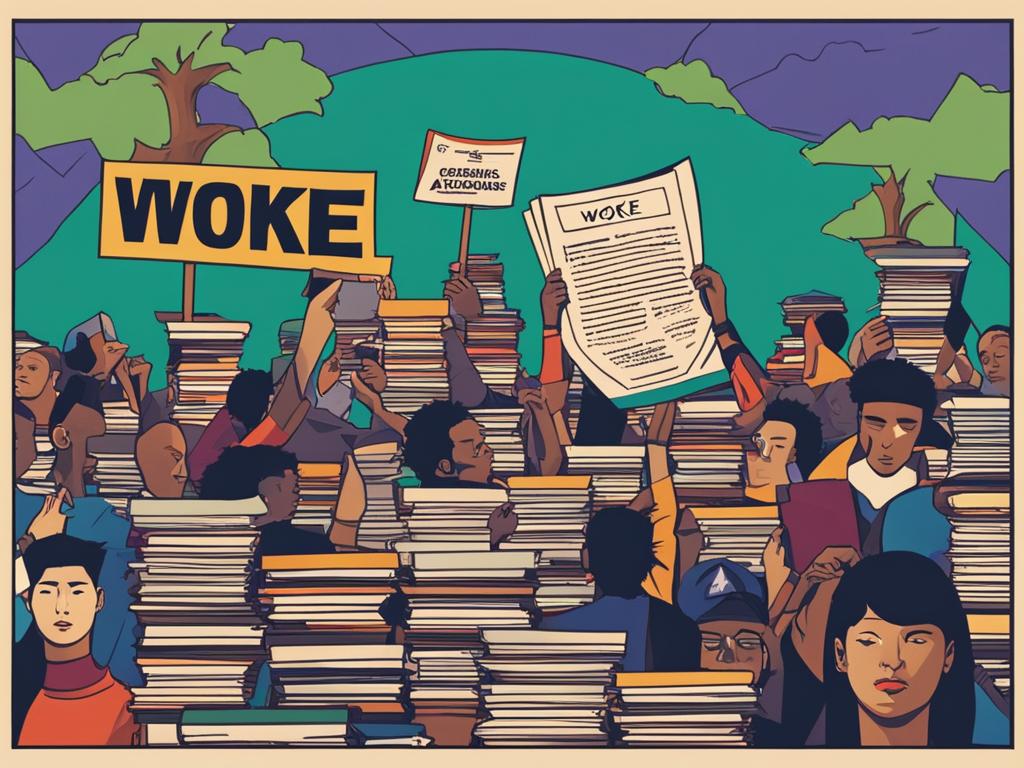Over the years, the concept of ‘wokeness’ has emerged as a driving force in American society, pushing for awareness and action against systemic racism and discrimination. However, it has also faced significant pushback from those who argue that it undermines the foundation of an inherently good America and threatens liberal values and beliefs.
This pushback against ‘wokeness’ stems from various quarters, including conservatives and some moderate Democrats. They raise concerns about the impact it has on social discourse and the potential consequences of its progressive ideas. Republicans often portray ‘wokeness’ as an example of progressive politics gone too far, while some establishment Democrats distance themselves from the term, either to avoid its delegitimization by Republicans or due to their own concerns about its effects.
Key Takeaways
- The term ‘wokeness’ has gained prominence as a means to address systemic racism and discrimination.
- Opponents argue that ‘wokeness’ undermines the idea of an inherently good America.
- Republicans and some establishment Democrats are critical of ‘wokeness’ and its impact on progressive ideas and liberal values.
- Understanding ‘wokeness’ requires recognizing its roots in liberal political philosophy and its focus on social justice and equality.
- Concerns about overreach and unintended consequences have been raised in relation to ‘wokeness’, including examples like the anti-police movement and discourse around cultural appropriation.
Understanding the Phenomenon of Wokeness
Wokeness, as a concept, has gained prominence in American society since the mid-2010s. It is associated with various social justice movements and discourse that aim to address structural injustices, particularly those related to identity.
Wokeness is rooted in the belief that individuals should be aware of and actively combat systemic discrimination and inequality. It encompasses the progressive ideas of liberal values, social justice, equality, and the protection of individual rights.
By promoting liberal political philosophy and advocating for social justice, wokeness seeks to challenge existing power structures that perpetuate inequities. It emphasizes the importance of recognizing and rectifying historical and ongoing injustices.
In the pursuit of equality, wokeness aims to dismantle systemic barriers that hinder marginalized groups from accessing equal opportunities. It encourages individuals to be conscientious about their own privileges and to use their voices and actions to create a more just and inclusive society.
| Key Themes of Wokeness |
|---|
| Social Justice |
| Intersectionality |
| Inclusion and Diversity |
| Systemic Discrimination |
| Antiracism |
| Gender Equality |
| LGBTQ+ Rights |
The principles underlying wokeness align with liberal political philosophy, which emphasizes the pursuit of individual rights, social justice, and equality. However, wokeness is not without its critics, who argue that it can lead to overreach and unintentional consequences. These concerns will be explored further in the subsequent sections.
However, before delving deeper into the potential drawbacks of wokeness, it is essential to comprehend its origins and its aims in fostering a more equitable and inclusive society.
Examples of Woke Overreach
Critics of wokeness argue that it often leads to overreach and unintended consequences. Despite its intentions to address systemic issues, wokeness has faced scrutiny for its potential negative impact on society. Let’s explore some examples of woke overreach:
The Anti-Police Movement
One example of woke overreach is the anti-police movement, which some argue fails to consider the importance of law enforcement in reducing crime. While advocating for police reform is a valid concern, completely defunding or dismantling police departments without considering the potential consequences can undermine public safety.
Inadvertent Glorification of Whiteness
There are concerns about the inadvertent glorification of whiteness in certain anti-racist materials. In an effort to combat racism, some materials may inadvertently perpetuate racial divisions by reinforcing stereotypes and unnecessarily focusing on race rather than promoting equality and inclusivity.
Restriction of Cultural Exchange
The discourse around cultural appropriation has sometimes resulted in the restriction of cultural exchange. While it’s important to address instances of cultural insensitivity, an overly restrictive approach can hinder cross-cultural understanding and create divisions between different communities.
Performative White Silliness and Language Craziness
Performative White silliness and language craziness are criticized as distractions from genuine efforts to address systemic issues. Instead of focusing on substantial policy changes or grassroots movements, the spotlight can be diverted to performative acts that may not result in tangible progress.
“Wokeness should not overshadow the need for practical and sustainable solutions to societal problems.”

| Examples of Woke Overreach | Concerns |
|---|---|
| The Anti-Police Movement | Fails to consider the importance of law enforcement in reducing crime |
| Inadvertent Glorification of Whiteness | Perpetuates racial divisions and reinforces stereotypes |
| Restriction of Cultural Exchange | Hinders cross-cultural understanding and creates divisions between communities |
| Performative White Silliness and Language Craziness | Distraction from addressing systemic issues |
The Impact of Wokeness on Institutions and Society
Wokeness, with its focus on liberal political philosophy and social justice, has left a lasting impact on various institutions, including universities and the American Civil Liberties Union (ACLU).
The evolving stance of the ACLU on civil liberties in the wake of wokeness has raised concerns about the organization’s core mission. The influence of wokeness on decision-making within the ACLU has prompted questions about whether it aligns with their historical commitment to defending individual rights and liberties.
Debates about authenticity and representation have also emerged within Hispanic/Latino communities due to the use of terms like “Latinx” associated with wokeness. Some argue that these terms fail to accurately reflect the sentiments and identities of different groups within the community.
Furthermore, explicit racial discrimination in the name of combating systemic injustices has caused division and controversy. For instance, charging higher fees for events based on the race of attendees has been criticized as both divisive and potentially illegal.

As wokeness continues to shape societal discourse, its impact on institutions and the broader fabric of society remains a subject of debate and scrutiny. While it seeks to address social injustice and promote liberal policies rooted in social justice, wokeness also faces criticism for its potential unintended consequences and its potential to undermine the very principles it aims to uphold.
Conclusion
The pushback against wokeness is a legitimate response to concerns about its overreach and potential negative consequences. While the concept of wokeness originated from a genuine pursuit of addressing social justice issues, its intrusion into various aspects of life, including non-political spaces, has caused discomfort for many.
Opposition to wokeness should not be misconstrued as a rejection of liberal beliefs, liberal values, or progressive ideas. Rather, it stems from a desire to preserve apolitical spaces and ensure that activism remains grounded in meaningful progress. It is essential to critically navigate the discourse around wokeness, distinguishing between legitimate activism and potential overreach.
By encouraging open dialogue and understanding, we can bridge the gap between those who support wokeness and those who push back against it. This approach allows for a more inclusive and nuanced conversation that benefits society as a whole, fostering genuine efforts to address social justice issues and achieve equality.
FAQ
What is wokeness?
Wokeness is a concept rooted in the belief that individuals should be aware of and actively combat systemic discrimination and inequality. It encompasses progressive ideas such as liberal values, social justice, equality, and the protection of individual rights.
Why is there pushback against wokeness?
The pushback against wokeness is justified due to concerns about its overreach and potential negative consequences. Critics argue that it can lead to unintended consequences and divisions between communities.
What are some examples of woke overreach?
Examples of woke overreach include the anti-police movement, restrictions on cultural exchange due to the discourse around cultural appropriation, and instances of performative activism that detract from genuine efforts to address systemic issues.
How has wokeness impacted institutions and society?
Wokeness has had an impact on various institutions, including universities and organizations like the American Civil Liberties Union (ACLU). The evolving stance of the ACLU on civil liberties and the influence of wokeness on decision-making within the organization have raised concerns about its core mission.
Does opposition to wokeness negate efforts for social justice?
Opposition to wokeness does not negate genuine efforts to address social justice issues or the pursuit of equality. It is crucial to navigate the discourse around wokeness critically, distinguishing legitimate activism from potential overreach to ensure meaningful progress in society.
